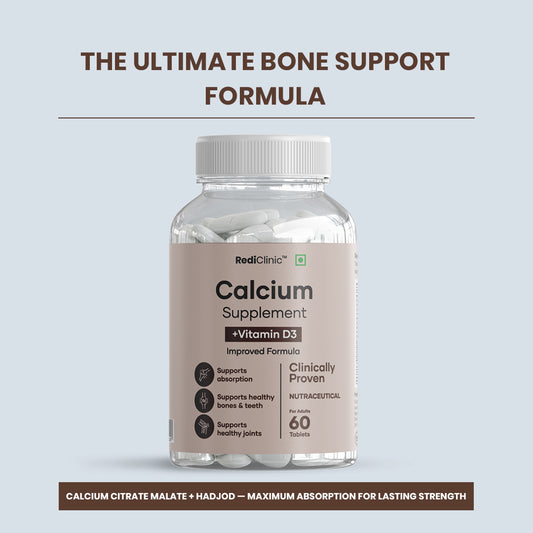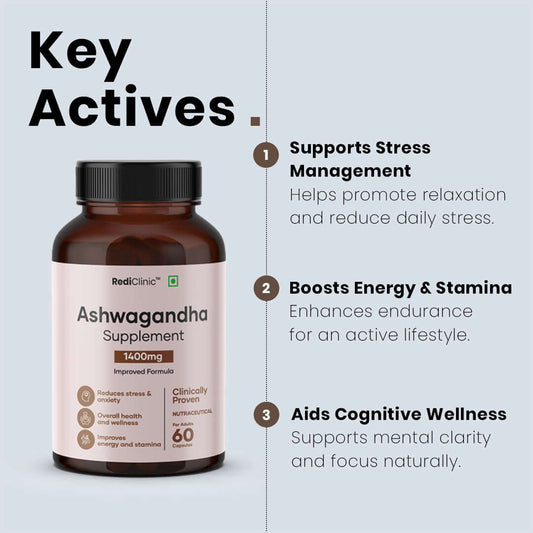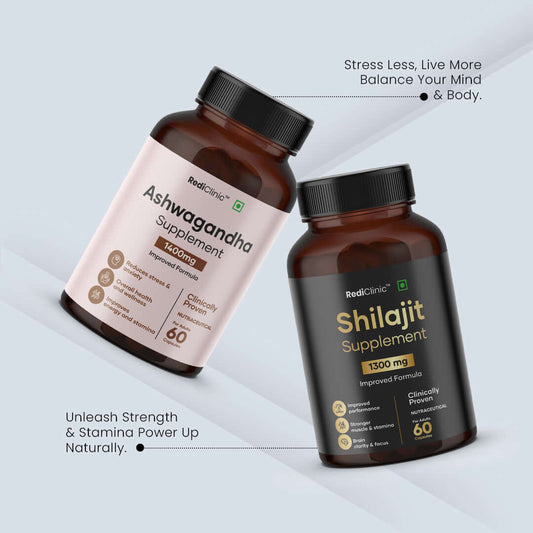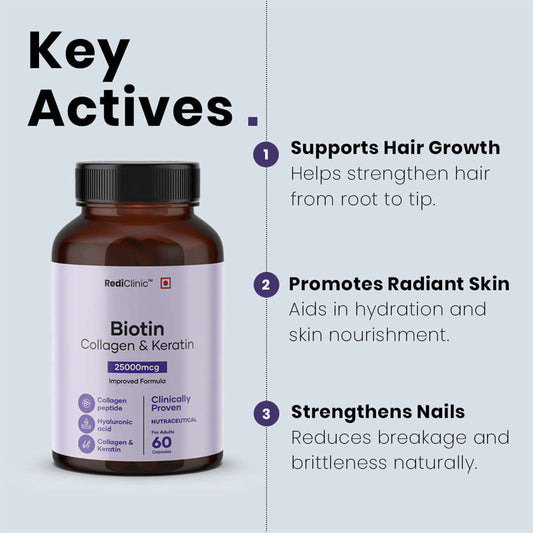Top 10 Benefits of Mindfulness and Nutrition for Holistic Health

Do you feel stressed by work, studies, or any kind of responsibilities? Overstress makes it hard to do your best. Be calm and do not let stress take over. Do you know that nutrition plays a huge role in relieving stress and heading towards mental clarity? Check this guide to see how proper nutrition contributes to mindfulness and a relaxed mind.
How do nutrition and mindfulness relate to each other?
In India, mindfulness combined with nutrition provides a holistic approach to health and guides individuals toward an acceptable relationship with food. Mindful eating encourages awareness of hunger cues, allowing a better control over portion size and preventing overeating. This practice supplements the more traditional Indian approach towards living conscious of the process and enjoying the body's better digestive processes and nutrient absorption.
At the same time, it reduces stress levels that, when at a decreased level, have positive effects on weight management and wellness. Mindfulness and nutrition can indeed combine to make a very strong, well-rounded foundation for wellness that honors the body and mind.
Overview of mindfulness practices
Mindfulness practice is described as the methods designed to enable a person to attend to the present moment with a nonjudgmental awareness of thoughts, feelings, and bodily sensations.
- Such techniques include mindful breathing, in which attention is focused on every breath and the way it could change the state of the mind, and body, in which increasingly every part of the body is allowed to be engaged with and released.
- Another important technique is mindful meditation, which enables people to examine their ideas objectively and without preconceptions.
- Other activities include mindful eating, mindful walking; these enable being in the present in most regular actions.
- These all tend to reduce stress, regulate emotions, and improve mental clarity.
What is the connection between mindfulness and eating?
The connection between mindfulness and eating basically lies in full awareness of the meal experience—savoring each bite, focusing on hunger and fullness cues, and being totally present without distraction. Mindful eating encourages the individual to be aware of flavors, textures, and the body's signals, thus preventing overeating and promoting healthy eating.
- Less tension: It creates a relaxed and respectful attitude towards eating and avoids food-related anxiety and tension.
- Improves digestion: The intake of food is eaten slowly and then chewed in a conscious manner, enhancing the rate of absorption and digestion.
- Healthier food choices: The awareness developed through mindfulness of what food will do to the body will help individuals make healthier and more balanced decisions in their intake.
- With Increased Awareness: Mindful eating allows one to appreciate the sensory experience from the food and its taste, texture, making meals even more wonderful.
- Portion Control: Mindfulness at mealtime gives more opportunity to identify hunger and fullness cues, so you're less likely to overeat.
- Healthy Relationship with Food: Nonrestrictive and healthy relationship with food is achieved through mindful eating, improving on many unhealthy patterns, such as emotional eating or guilt over meals.
Childhood is basically the growth period; hence, nutritional requirements at this phase are very crucial. In the United States, in 2014, an estimated 18.5% of the children aged 2 through 19 had obesity with increasing trends. Further, intakes of fruits and vegetables have also proved inadequate since only 9% of children consume fruit at the levels recommended in a day, with 2% in vegetables. In further analysis, iron deficiency is present in approximately 7.1% of children aged 1 to 5.
Benefits of Mindfulness and Nutrition for Holistic Health:
Improved Digestion: Mindful eating enhances nutrients absorption.
Stress Relief: Helps to relieve stress for balanced hormones.
Weight Control: Promotes long-term weight control.
Smarter Choices: Promotes healthy food choices.
Mental wellness: Improves mood and concentration with nutritional balance.
How mindfulness can improve dietary choices?
Mindfulness encourages a greater awareness of hunger and fullness indicators, leading people to make better dietary decisions about what and when to eat.
- It can ensure that eating is avoided during those time slots wherein most overeating and junk snacking occur, such as when they are unconscious of what they are eating or even during tasteless mastication.
- Because it encourages a non-judgmental attitude towards food and strengthens control over cravings and impulsive eating patterns, mindfulness practice also reduces emotional eating.
- Everything considered, mindfulness enables people to make more mindful, healthy food choices that help them maintain their wellbeing.
Mindful eating does demand commitment and attention, as does every diet or eating plan. While its primary benefit is not losing weight, it is probably true that those who will actually practice mindful eating on a regular basis will lose excess pounds and retain the loss.
What are the Nutritional Strategies for Mindfulness?
In order to improve health, mindfulness-based nutrition solutions suggest being thoughtful and deliberate when making food choices. The best components of a balanced meal are proper portions of the three big nutrient-rich food categories: fruits, vegetables, lean proteins, and healthy fats.
- Avoid emotional eating: Understand your trigger to eating and develop some healthier ways to handle stress and emotion by using mindfulness techniques.
- Pay Attention to Your Body: The Sound of Truly Listening: Focus on the cues of your hunger and fullness; Eat when hungry and stop before satisfied- no overeating.
- Consider Portion Management: Provide smaller portions and take off the television, a computer, or any other distractions so that you focus on eating, and therefore it will be easier to feel when you've had enough.
- Eat Slowly and Mindfully: Let the enjoyment of each mouthful stay in your mouth. Be guided by the mouthfeel, the flavor, and the smell to digest food better and feel satisfied.
- Mindful Grocery Shopping: Plan your meal, choose a whole nutrient-dense food, and avoid impulse buying that might lead you to unhealthier eating habits.
By encouraging a more careful approach to eating, these techniques can promote improved nutrition and overall happiness.
Foods that enhance focus and well-being
In India, particular foods can improve general wellbeing, cognitive performance, and focus. Here are a few significant examples include
- The actual foods that are richest in nutrients most often have been found to be leafy greens, such as spinach, kale, and broccoli-all of which are really good at providing vitamin inputs as well as antioxidants that have protective influence over the brain and contribute to improving thought processes.
- Berries are believed to enhance cognitive performance since they are antioxidant in nature. They were found to have limitations in oxidative stress, increase memory and brain function.
- Nuts and seeds, such as almonds and chia seeds, are also rich in lipids, minerals, and vitamins.
- One substance that may improve mood and memory is turmeric, which also has anti-inflammatory properties.
- Green Tea: This combines caffeine and L-theanine so that there is alertness with a focus.
- Whole Grains: Oats, quinoa, and brown rice furnish with constant energy flow so that you can focus at any point in the day.
- Eggs: These are in rich protein and choline; they assist the bodily cognitive functions and remember things, and regulate the moods.
- Avocados: They contain healthy fats that increase the flow of blood to the brain, and thus one helps to focus better and gain clearness in the mind.
- Dark Chocolate: It holds flavonoids, which can improve mood and cognitive functions, thus enhancing concentration.
- Fatty Fish: The omega-3s in these fish, especially in fish like salmon, sardines, and mackerel, have effects that put the memory straight and help enhance the mind's clarity and concentration.
The different studies have suggested that mindful parenting, which entails compassion and regulation of emotions, can help minimize emotional eating behaviors among children. Mothers with mindfulness in eating are likely to encourage healthy consumption habits and shared feeding roles and prevent childhood obesity and chronic diseases.
What are the Tablets to Support Mental Clarity?
Brain function and mental clarity can be promoted with a number of supplements:
- Ginkgo Biloba: The herbal supplement serves to enhance cognitive functions and memory due to better blood circulation toward the brain.
- Golden Root is a herb that's shown to reduce anxiety and tiredness, both factors that help enhance clear thinking and focus.
- Fish oil, which is produced commercially as a nutritional tablets, contains something known as omega-3 fatty acids-a group that has been classified as essential fatty acids and that is known to generally benefit the health of the brain. It will improve both focus and memory.
- B Vitamins: Contain B12 and folate, which the brain uses to function and counteract the sensation of brain fog, therefore giving sharp mental clarity.
- L-Theanine: It is commonly co-administered with caffeine. It induces relaxation without causing drowsiness that normally enhances attention and thinking.
- Vitamin D is one of the most well-known nutrient factors associated with brain function. Several studies indicate an effect on mood and cognitive functioning in a human when their levels of vitamin D are depleted.
- Caffeine: Mild and not excessive, caffeine can be an excellent stimulant to the brain for work concentration. It shows alertness raising the level of attention.
Taking these vitamins along with a healthy diet and lifestyle could support the development of brain focus and cognitive wellness. Any supplementation should be spoken with a healthcare provider before beginning.
What are the Best supplements for cognitive function?
The following are some of the best supplements that have been demonstrated to improve brain function:
- Ginkgo Biloba: Enhance blood flow to the brain, where there may be an improved memory and quickening cognitive speed.
- B Vitamins: B6, B9 (folate), and B12 - helps in reducing brain fog with the maintenance of health in nerves, therefore resulting in the ideas coming together clearly in focus.
- DHA and EPA: These are vital fats found in fish oil, important to keep your brain functioning normally for memory and focus.
- Rhodiola Rosea: It is used as an adaptogen to help one's body realize its ability to deal with stress, so one would be less fatigued and better able to concentrate and persevere mentally.
- L-Theanine with Caffeine: This combined effect is alertness and concentration without causing one to get jittery so one can peacefully sustain attention.
- Acetyl-L-Carnitine: It can be seen as an alertness-enhancing ingredient and is meant to fuel energy within brain cells in order to boost the performance of focus and cognition.
Different studies have been done to examine the effects of acceptance-based strategies on the alleviation of cravings for sweets. For instance, Forman et al. (2013) and Jenkins and Tapper (2014) provided brief acceptance strategies for participants to use, which only slightly reduced sweet consumption. Conversely though, Hulbert-Williams et al. (2019) reported that acceptance resulted in decreased chocolate intake in an experimental context, but not in food diary self-report records.
Conclusion:
This approach provides a powerfully solid foundation for holistic well-being because mindfulness and balanced nutrition were interwoven. Mindful eating supports conscious food choices to facilitate better digestion and reduce tension and stress. A nutrition-rich diet supports energy and healthy brain function and a thriving life. Because ancient practice emphasizes a balanced mind and body relationship, such as through yoga and Ayurveda, the blending of mindfulness with nutrition is culturally sensitive and beneficial in India. Take it easy—do not over stress. Mindfulness and nutrition have been symbiotically working together to enrich wellbeing and healthy lives.
FAQ’s:
1. How does mindfulness affect my eating habits?
Mindfulness would be concentrating on hunger and fullness cues; it brings about more thoughtful food choices. It often guides you away from overeating and emotional eating and keeps your mindset healthy about food.
2. Can certain foods improve mental clarity?
Yes, food can be the clarity booster. High intake of omega-3 fatty-acid-containing foods like salmon; consumption of berries rich in antioxidants; B vitamins from leafy green vegetables-all support brain health, improve focus, and enhance cognitive function.
3. What are the best mindfulness practices for health?
Meditation, mindful eating, and mindful breathing all illustrate mindfulness techniques that also reduce stress, improve concentration, and boost overall wellness in individuals. These methods promote mental clarity and a more positive mind-body connection.
References:
1.Kapoor A, Dunn E, Kostaki A, Andrews MH, Matthews SG. Fetal programming of hypothalamo-pituitary-adrenal function: prenatal stress and glucocorticoids. J Physiol. 2006;572(pt 1):31-44. [DOI] [PMC free article] [PubMed] [Google Scholar]
2. Liao XP, Yu Y, Marc Iet al. Prenatal determinants of childhood obesity: a review of risk factors. Can J Physiol Pharmacol. 2019;97:147-154. [DOI] [PubMed] [Google Scholar]
3. Golen RB, Ventura AK. Mindless feeding: is maternal distraction during bottle-feeding associated with overfeeding? Appetite. 2015;91:385-392. [DOI] [PMC free article] [PubMed] [Google Scholar]
No comments


























0 comments